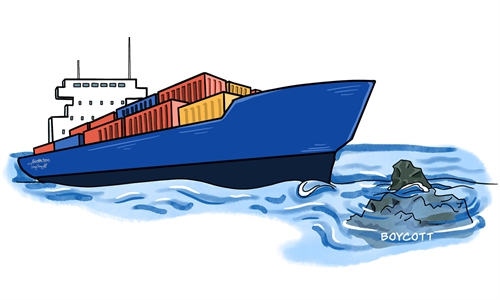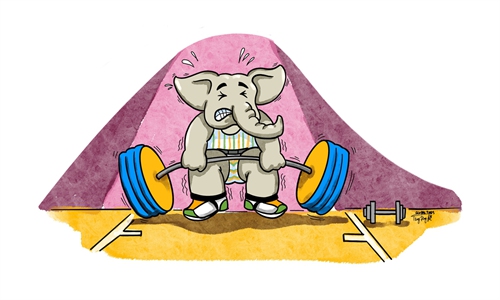
Illustration: Tang Tengfei/GT
The US and India have seen more frequent exchanges lately, especially when it comes to the stunt of "countering China's rise." As the world is shifting into post-pandemic era, with global industrial chains seeing adjustment, timely finding a beneficial position for India while avoid taking sides between China and the US, will be a test for the wisdom of the Modi administration.
US Defense Secretary Lloyd Austin is likely to visit India soon, "as the two allies seek to deepen military ties to counter the growing power of China in the Asia-Pacific region," the Reuters reported, citing anonymous Indian government source.
Regardless whether the visit will be scheduled as reported, India, a leading un-aligned nation neighboring China, has seen increasing attention from the US-led anti-China clan. Under the framework of the so-called Indo-Pacific strategy, the countries have been playing up various topics with an aim widely interpreted as containing the development of China, from economic, technology to defense ability growth.
However, the economic and trade agenda seems to be lagging behind within the framework due to their policy difference, economic status and national interest differentiation. The framework clearly cannot offer effective and timely boost for the economic recovery of those countries, shadowed by the COVID-19 pandemic.
India, whose economic development and industrial structure lags far behind the US, Japan and Australia, is facing a key strategic choice concerning the country's long-term development.
Other than simply following the heels of the US government' anti-China posturing and putting its own development at peril, it ought to seek a beneficial position for India between the two largest economies, which needs wise brains in New Delhi.
Now the world has started down the bumpy road of economic recovery, with global industrial chains facing some degree of adjustment. If India could make its position to better integrate itself into regional and global value chains, it will lay a solid foundation for the development of Indian economy in the coming years or even decades. For instance, even between industries of China and the US, there are spaces for the South Asian country to locate and win a share of the value chain, or play a linkage role between the largest economies.
On the other hand, facing the onslaught of the virus, Asia-Pacific economies have generally displayed stronger resilience, maintaining a relatively smooth operation of the regional value chain and have made significant progress in economic integration.
The vast majority of economies in the region could continue the momentum and achieve common prosperity through mutually beneficial cooperation and peaceful coexistence, rather than blindly adopting the US government' political agenda.
Playing geopolitical games will not be able to deliver a rosy and stable future for India, and its repeated move to economically decouple from China has proved to be in vain after China regained the top position of its trading partners in 2020. It is not a picking-sides issue for New Delhi between the two powers, and forming a benign development relationship with both China and the US may be a better path for India.


